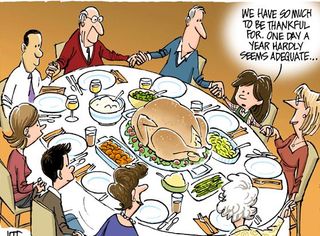After stuffing yourself tomorrow with turkey, gravy, and pumpkin pie… and perhaps after winning the family betting pool on predicting when Aunt Marge will unbuckle the top few buttons of her pants, I want you to put some time aside to consider a brand new habit… Celebrating Thanksgiving every day. What do I mean by this?
I mean the Doctor is prescribing a dose of daily gratitude…either in the morning with your vitamins or at night before going to bed. Why? Because science has discovered that it may aid your health and well-being beyond what we have ever known.
You see, gratitude has only recently been put under the microscope from a scientific research perspective. Prior to the last 15 years, the subject was left to philosophers and religious leaders as the appropriate experts to extol its benefits. However, once scientists began studying gratitude, they were so impressed by the findings, that research in this area has exploded. Take a look at some of the findings in the below paraphrased list from a research project on Gratitude and Thankfulness.
- Studies show that those who keep gratitude journals on a weekly basis exercise more regularly, report fewer physical symptoms, feel better about their lives as a whole, and are more optimistic about the upcoming week compared to those who record hassles or neutral life events (Emmons & McCullough, 2003).
- Young adults who are taught self-guided exercises for daily gratitude report higher levels of the positive states of alertness, enthusiasm, determination, attentiveness and energy compared to other groups, who tend to focus on hassles or a downward social comparison (ways in which participants think they are better off than others).
- Study participants practicing gratitude are more likely to report having helped someone with a personal problem or having offered emotional support to someone, compared to a group focused on hassles or social comparison condition.
- In a sample of adults with neuromuscular disease, a 21-day gratitude intervention resulted in greater amounts of high-energy, positive moods; a greater sense of connectedness to others; more optimistic ratings of one’s life; and better sleep duration and sleep quality, relative to a control group.
- Children who practice grateful thinking have more positive attitudes toward school and their families (Froh, Sefick, & Emmons, 2008).
- Grateful people report higher levels of positive emotions, life satisfaction, vitality, and optimism. In addition, they report lower levels of depression and stress. The disposition toward gratitude appears to enhance pleasant feeling states more than it diminishes unpleasant emotions. Grateful people do not deny or ignore the negative aspects of life.
- Prosociality: People with a strong disposition toward gratitude have the capacity to be empathetic and to view the perspective of others. They are rated as more generous and more helpful by people in their social networks (McCullough, Emmons, & Tsang, 2002).
- Spirituality: Those who regularly attend religious services and engage in religious activities, such as prayer reading, are more likely to be grateful. Grateful people are more likely to acknowledge a belief in the interconnectedness of all life, and a commitment to, and responsibility to others (McCullough et. al., 2002). Gratitude does not require religious faith, but faith enhances the ability to be grateful.
- Materialism: Grateful individuals place less importance on material goods; they are less likely to judge their own and others' success in terms of possessions accumulated; they are less envious of others; and are more likely to share their possessions with others, relative to less grateful persons.
- Goal Attainment: Gratitude is linked to significantly improved personal goal attainment. In one study, participants in one group kept gratitude lists. This group ended up more likely to have made progress toward important personal goals (academic, interpersonal and health-based) over a two-month period than subjects in the control group, who underwent other exercises toward goal attainment.
There are many ways to develop a practice of daily gratitude. You can create a gratitude journal. Or, if you have an Iphone you can download a gratitude app.
What's clear through the research is that if you don't lean more towards gratitude than complaining, you and those around you will most likely suffer as result. So, follow the Doctor's prescription and begin a practice of gratitude, starting today. You won't regret it…
Editor's Note: This article was written by Dr. David Mashburn. Dave is a Clinical and Consulting Psychologist, a Partner at Tidemark, Inc. and a regular contributor to WorkPuzzle. Comments or questions are welcome. If you're an email subscriber, reply to this WorkPuzzle email. If you read the blog directly from the web, you can click the "comments" link below.

